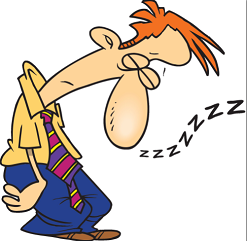Do Not Take Fatigue Lying Down
Have you ever had one of those days where you are so weary, you can’t seem to do anything except binge-watch Netflix?
Sure, everyone gets tired sometimes, and we often bounce back after a quick rest or a good night’s sleep. However, if bouts of fatigue occur more often and last longer, you shouldn’t ignore them.
“Older adults may chalk up fatigue to aging, but there is no reason you should battle ongoing tiredness,” says Dr. Suzanne Salamon, a geriatric physician with Harvard-affiliated Beth Israel Deaconess Medical Center.
Here are signs that you should take your tiredness seriously:
- inability to do activities you enjoy
- waking up exhausted, even after a good night’s sleep
- not feeling motivated to begin the day
- sudden bouts of exhaustion that go away and then return
- shortness of breath.
This type of fatigue can affect your health in many ways. You may have less energy to exercise. You may have trouble concentrating, staying alert, and remembering things. You may anger easily and become more socially isolated.
It’s worth checking in with your doctor
Fatigue also could signal a medical condition, according to Dr. Salamon, and you should consult your doctor to see if you have any of the following issues.
- This occurs when your blood has too few red blood cells or those cells have too little haemoglobin, a protein that transports oxygen through the bloodstream. The result is a drop in energy levels.
- Heart disease. Heart disease can cause the heart to pump blood less efficiently and lead to fluid in the lungs. This can cause shortness of breath and reduce the oxygen supply to the heart and lungs, making you tired.
- Sleep problems. Sleep apnea is characterised by pauses in your breathing, often lasting several seconds, or shallow breathing while you sleep. It is common among older adults and those who are overweight. Another sleep-related issue is an overactive bladder, which forces repeated nighttime bathroom trips. Either of these can disturb your sleep enough to leave you feeling tired during the day.
- Certain medications can make you feel tired, such as blood pressure drugs, statins, antidepressants, antihistamines, nonsteroidal anti-inflammatory drugs, and cold medications. “People react to medications differently and they often end up taking more as they get older,” says Dr. Salamon. Check with your doctor, especially if you have added a new medication or recently increased your dosage. “Sometimes it helps to take certain medicines, which may cause fatigue, at night rather than in the daytime,” she says.
- Low-grade depression or anxiety. Mental health issues often drain energy levels. “You may suffer from depression or anxiety and not even know it,” says Dr. Salamon.
- Myalgic encephalomyelitis/chronic fatigue syndrome (ME/CFS). This is a complex disorder that causes unexplained extreme fatigue, which can worsen after physical or mental activity and does not improve with rest. Its cause is unknown, but may be linked to one or more underlying issue.
Some simple ways to boost energy levels
For regular, everyday fatigue, try these tips:
- Drink a cup of coffee or tea. A little caffeine can jump-start your day, she says. “You don’t need more than that, but it can offer a mental and physical lift, especially if you have trouble with morning fatigue.”
- Go for a 30-minute walk. “If you can’t get outside, walk around your house in bouts of 10 to 15 minutes, two to three times a day,” says Dr. Salamon.
- Take a nap. A midday nap can help overcome tiredness later in the day. Keep naps to about 20 to 30 minutes, as studies have suggested that napping for 40 minutes or longer can have the opposite effect and leave you feeling groggy rather than refreshed. “Also, don’t nap too late in the day or in the early evening, when it could interfere with your normal sleep schedule,” says Dr. Salamon.

